Top 17 ZoomInfo Competitors and Alternatives for 2025
ZoomInfo is a popular B2B sales intelligence platform that helps businesses with sales intelligence, lead generation, and prospecting. This prospecting platform gives companies the data they need to find and reach the right decision-makers.
ZoomInfo is a powerful tool, but many users find it too expensive and occasionally report data inaccuracies. It is important for users to consider competitors and other platforms before purchasing a paid plan.
BookYourData is the best alternative to ZoomInfo, as it is known for its accurate database, pay-as-you-go pricing model, and real-time verification. The pricing model of BookYourData is more affordable than ZoomInfo’s subscriptions, so it is an ideal choice for small businesses and startups.
The top competitors of ZoomInfo are BookYourData, Dealfront, 6sense, Cognism, LinkedIn Sales Navigator, Apollo.io, Seamless.AI, Lusha, Hunter.io, Kaspr, Lead411, LeadIQ, SalesIntel, Salesgenie, UpLead, CrunchBase, and RocketReach.
The best alternatives to ZoomInfo are described below.
- BookYourData: BookYourData is a B2B data provider that offers real-time verified contacts, accurate B2B data, and a simple pay-as-you-go pricing model that suits businesses of all sizes.
- Dealfront: Dealfront is a European-based sales intelligence platform that offers company data, intent signals, and GDPR compliance to help businesses grow in EU markets.
- 6Sense: 6Sense is a contact information provider that focuses on intent data and account-based marketing, and it uses AI to predict buyer behavior and find high-quality leads for sales teams.
- Cognism: Cognism is a B2B data provider that offers GDPR-compliant data and has a strong focus on Europe and accurate intent-based targeting.
- LinkedIn Sales Navigator: LinkedIn Sales Navigator is a tool from LinkedIn that allows users to find and connect with potential leads using advanced search filters and insights.
- Apollo.io: Apollo.io is a sales intelligence platform that offers a contact database with tools for outbound sales, like email automation and activity tracking.
- Seamless.AI: Seamless.ai is a tool that uses AI to find B2B emails and phone numbers while keeping contact info up-to-date and accurate.
- Lusha: Lusha is a lead generation tool that provides accurate B2B contact details and integrates easily with CRMs, which makes it the best choice for sales and recruitment teams.
- Hunter.io: Hunter.io is a contact-finding tool that helps users find and verify professional email addresses by domain name, which makes it perfect for lead generation and outreach.
- Kaspr: Kaspr is a lead generation tool that helps users find phone numbers and emails directly from LinkedIn profiles in real-time. It’s great for sales reps looking to speed up outreach.
- Lead411: Lead411 is a B2B data provider that offers verified email and phone data, along with intent signals that show when companies are ready to buy.
- LeadIQ: LeadIQ is a tool that captures lead lists directly from LinkedIn and then improves them with verified contact details to upload them into CRMs seamlessly.
- SalesIntel: SalesIntel is a B2B marketing tool that provides human-verified contacts and intent data while focusing on high accuracy and integration with CRMs.
- Salesgenie: Salesgenie is a cloud-based lead generation platform that helps businesses find and connect with potential customers.
- UpLead: UpLead is a lead generation tool that provides verified B2B contact data and offers real-time email verification to reduce bounce rates.
- Crunchbase: Crunchbase is a B2B marketing tool that provides company insights, like funding, investments, and growth signals, and it is used a lot by investors, startups, and sales teams.
- RocketReach: RocketReach is a lead generation tool that helps users find emails and social media links for professionals across industries, and it is often used for outreach and recruiting.
1. BookYourData
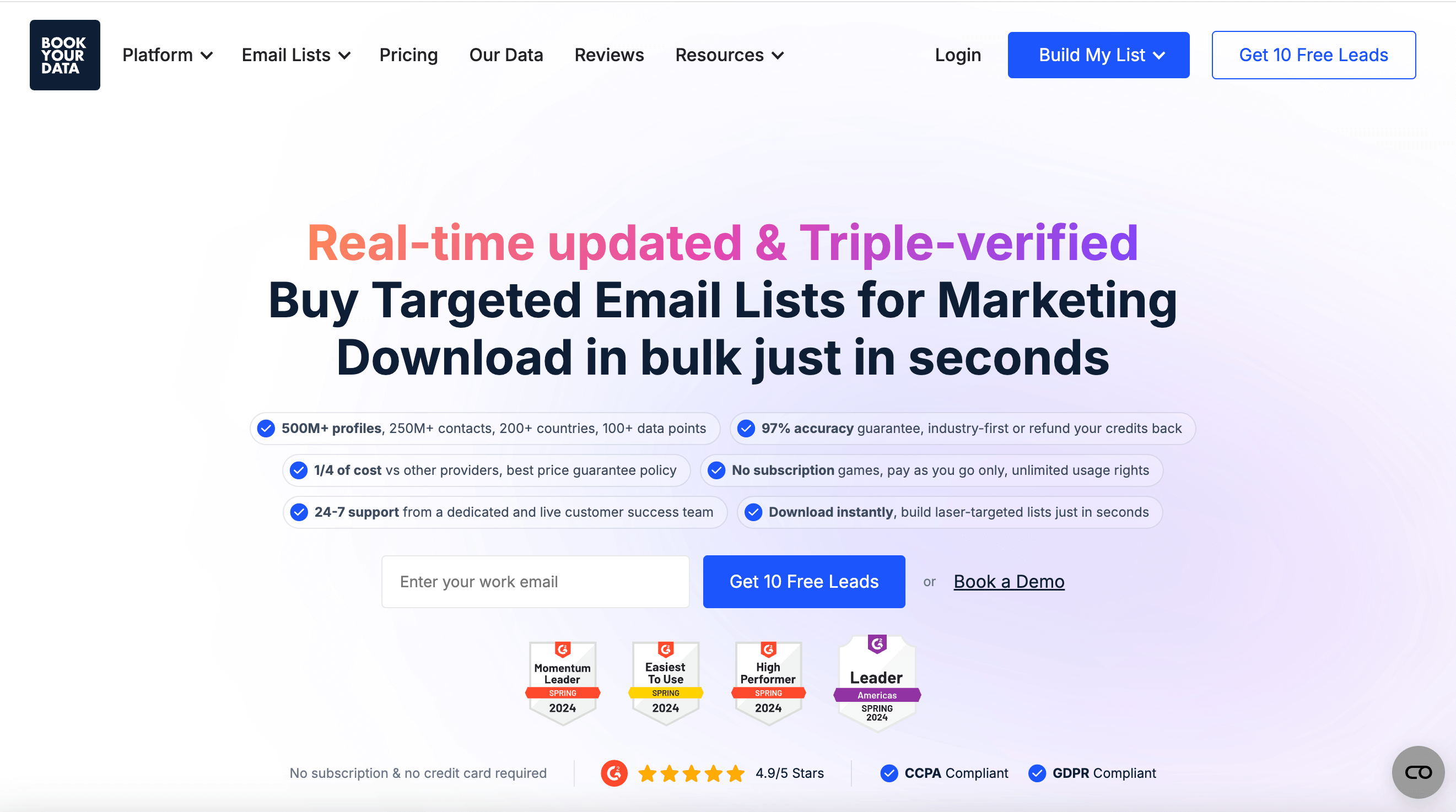
BookYourData is a B2B data intelligence platform that is designed for lead generation, sales outreach, and recruitment. It provides access to a global database that includes over 250 million B2B contacts.
What makes it popular
- Offers real-time verified contacts
- Has a simple pay-as-you-go pricing model.
- Budget-friendly pre-built lists available.
- Offers high data accuracy with 97% guarantee and affordable plans.
- Job titles are globally standardized (e.g., CHRO and People Champion are recognized as equivalent).
Key features
- Global B2B database with over 250 million verified business accounts from more than 200 countries.
- Advanced filtering to find niche leads, based on job title, industry, location, and company size.
- Instant downloads of verified leads.
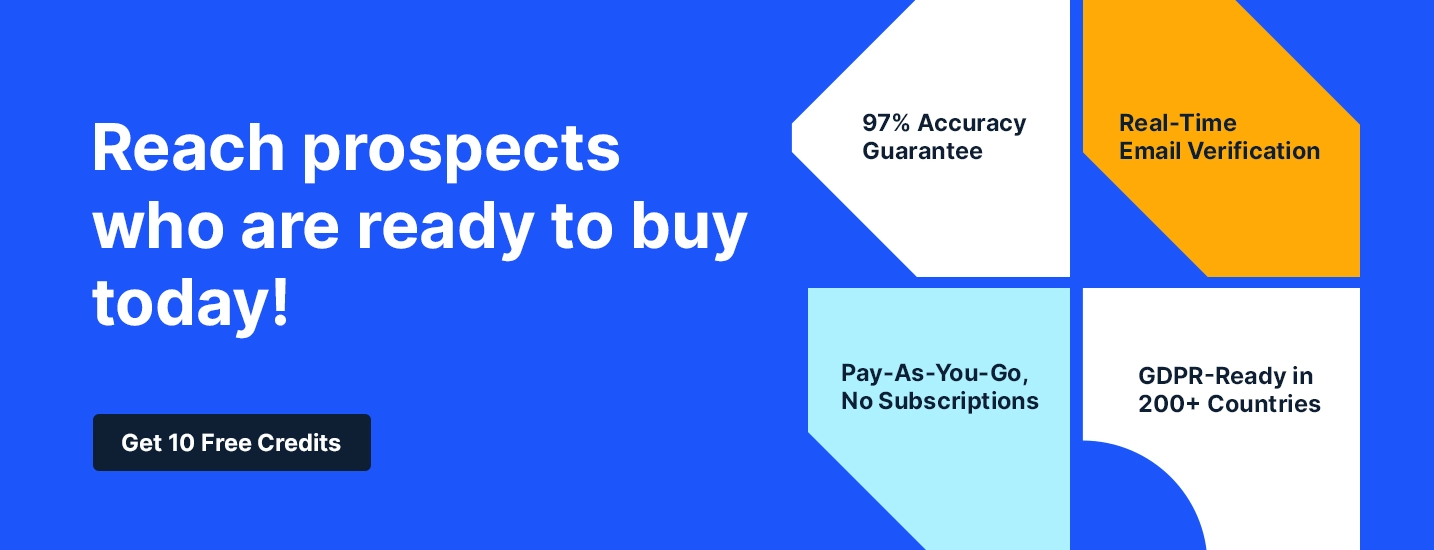
Pros
- Accurate and up-to-date data
- 97% Accuracy guarantee
- Real-time email verification
- No long contracts and flexible pricing
- Easy to use for small and mid-sized businesses
- Various customer support channels, like email, phone, and live chat
Cons
- Limited extra sales engagement tools
- Less intuitive platform
- Limited AI capabilities
Pricing
- Free plan: The free plan is best for trying out the tool, as it offers 10 free credits, with no subscription or credit card required, and includes access to almost all features, like contact-finding and instant downloads.
- Pay-as-you-go packs: BookYourData’s pay-as-you-go model starts from $99 and charges $0.40 per contact. It requires no subscription with no minimum commitment. Credits never expire, and you only pay for verified and deliverable contacts. The more contacts/credits you order at a time, the less you pay per contact.
Customer support
BookYourData offers helpful customer support through email and live chat. The response times are fast, and they provide detailed help for account or payment issues.
Customer reviews
BookYourData is reviewed very positively for the highly accurate leads, low bounce rates, helpful search filters, and customer support.
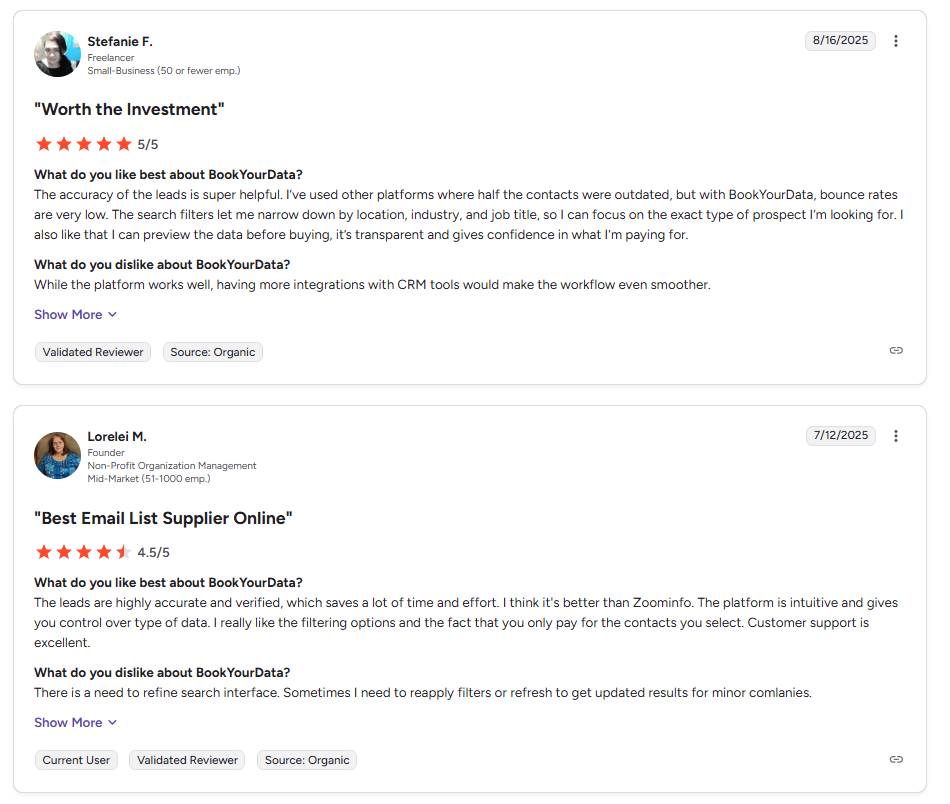
Another user also mentions that BookYourData provides more control over the data than ZoomInfo and has a more flexible pricing system. The platform has a G2 rating of 4.9/5 stars.
2. Dealfront
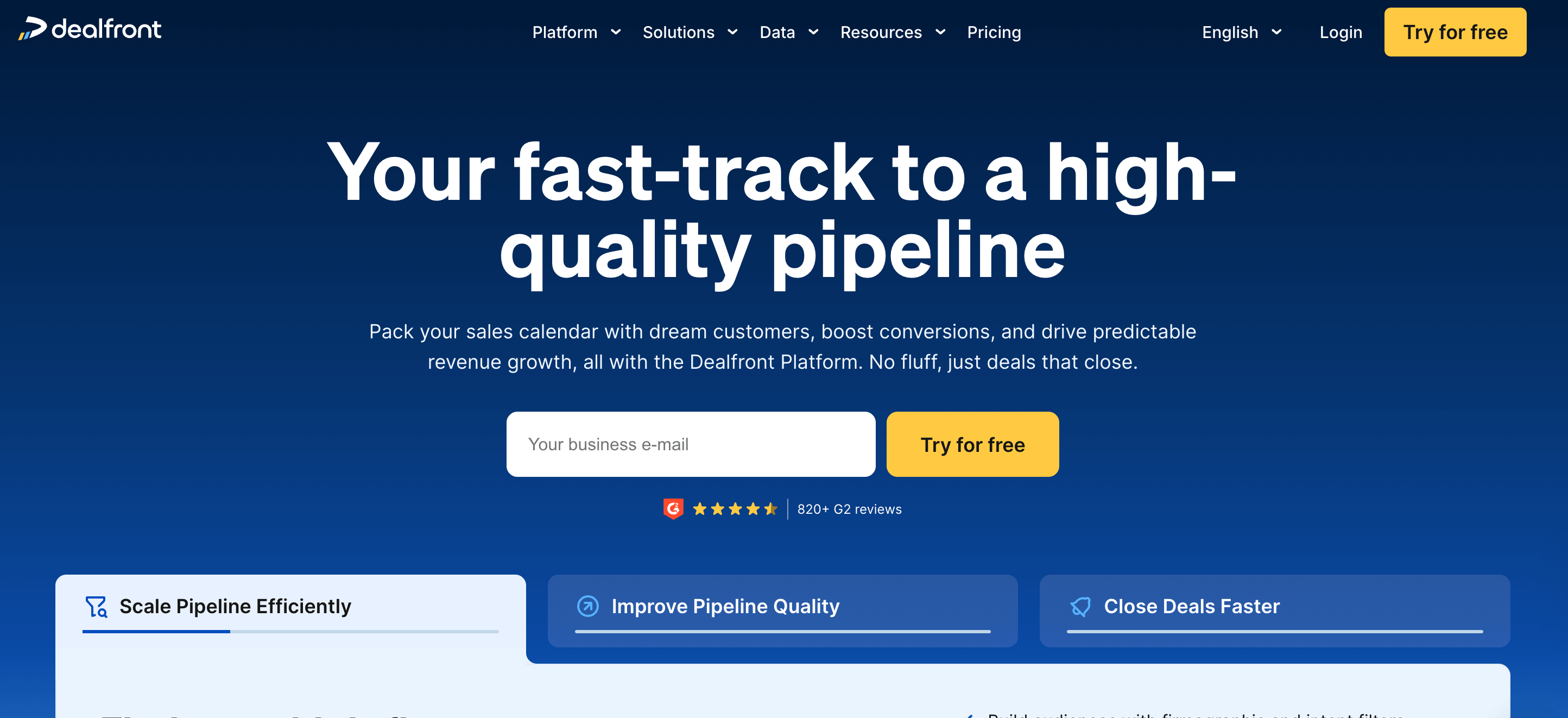
Dealfront is a European-based GTM (Go-to-Market) platform that helps businesses find, target, and connect with the right leads and clients. It offers company data, intent signals, and website visitor tracking to increase the efficiency of lead generation.
What makes it popular
- Has a strong focus on European B2B markets.
- Offers GDPR-compliant data, which is helpful for businesses based in Europe.
- Built on public and trade register data
Key features
- Delivers AI-powered intent data to spot buyers early
- Converts anonymous website visitors into actionable leads
- Integrates seamlessly with CRM and marketing automation tools
- Automates data enrichment with real-time company updates
Pros
- Strong EU compliance and privacy standards.
- Good intent data for account-based marketing.
- User-friendly interface
- Comprehensive contact information
Cons
- Smaller database outside of Europe.
- High licensing costs
- Filtering issues regarding job titles and export limitations
- Lack of built-in keyword options
Pricing
The pricing plans of Dealfront are not publicly listed, as the cost depends on the number of seats and credits you purchase. The credits are only used when users download or bulk-sync datasets.
Customer support
Dealfront offers strong customer support through email, phone, and dedicated account managers.
Customer reviews
Dealfront is reviewed positively for providing highly detailed firmographic data and seamless CRM integration with a friendly user interface.
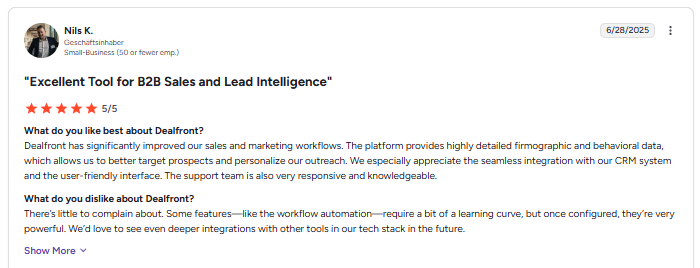
Another reviewer mentions that the search filters on Dealfront are easy to use, but the credit system limits the number of contact exports. The platform has a G2 rating of 4.5/5 stars.
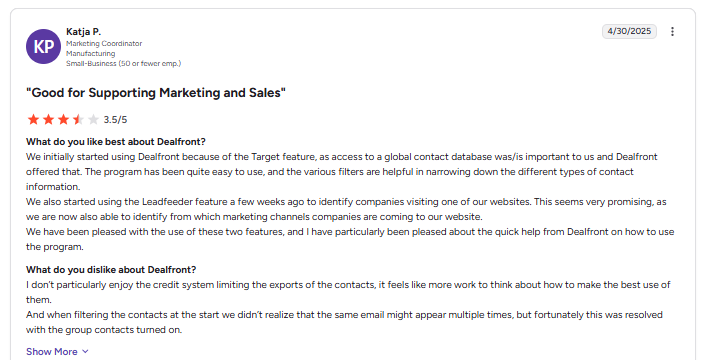
3. 6sense
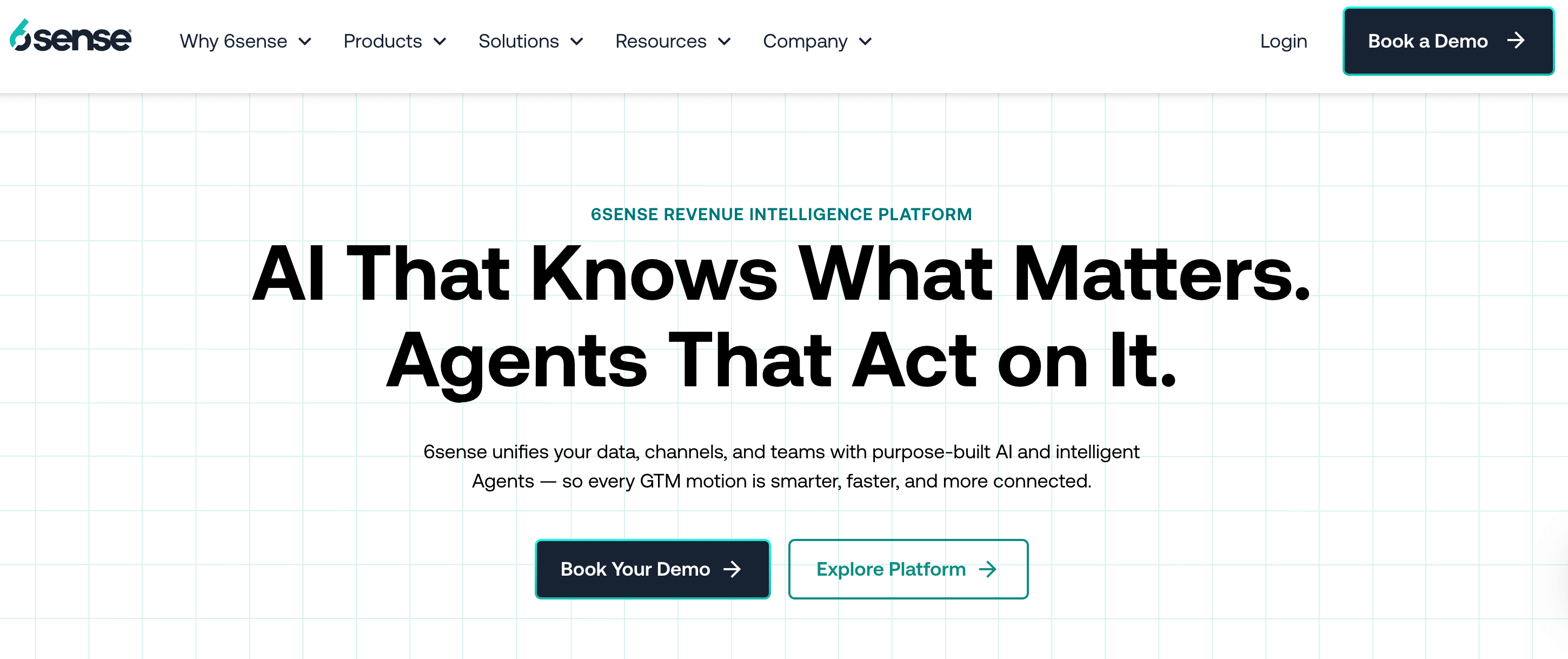
6sense is a Revenue Intelligence platform that uses AI and intent data to predict buying behavior. It helps businesses prioritize leads and customize their outreach process. It is a popular tool among enterprise teams for advanced account-based marketing.
What makes it popular
- Uses AI and machine learning for demand generation
- Widely used for account-based marketing (ABM).
- Identifies and prioritizes high-value accounts
- Offers cross-channel engagement capabilities
Key features
- AI-powered intent signals.
- Helps sales teams find buyers instantly.
- Predictive analytics for pipeline forecasting.
- Buyer journey mapping and insights.
- CRM and marketing automation integrations.
- Account-Based Marketing (ABM) tools
- Intent data for buyer signals
- Lead segmentation and scoring
- Campaign management and optimization
- Reporting and sales intelligence insights
Pros
- Strong for ABM strategies.
- Helps focus on high-value accounts.
- Strong buyer journey tracking
- Increases engagement up to 40–60% using advanced ABM tools
- Provides exceptional customer support and onboarding
- Improves ROI by reducing wasted spend
Cons
- Higher cost compared to smaller tools.
- Learning curve for new users.
- Multiple licenses for Salesforce teams
- Slow data refresh rate
- Less suitable for a small or regional market focus
Pricing
- Free plan: The free plan provides 50 free credits for a whole month and offers features like a Chrome extension, sales alerts, and list builders.
- Sales intelligence pack: The sales intelligence pack has custom pricing that is not publicly available and depends on the features you choose, such as data credits, predictive AI, or both.
Customer support
6Sense offers helpful customer support to its users with a dedicated support page. It also provides onboarding specialists who help new users learn the platform.
Customer reviews
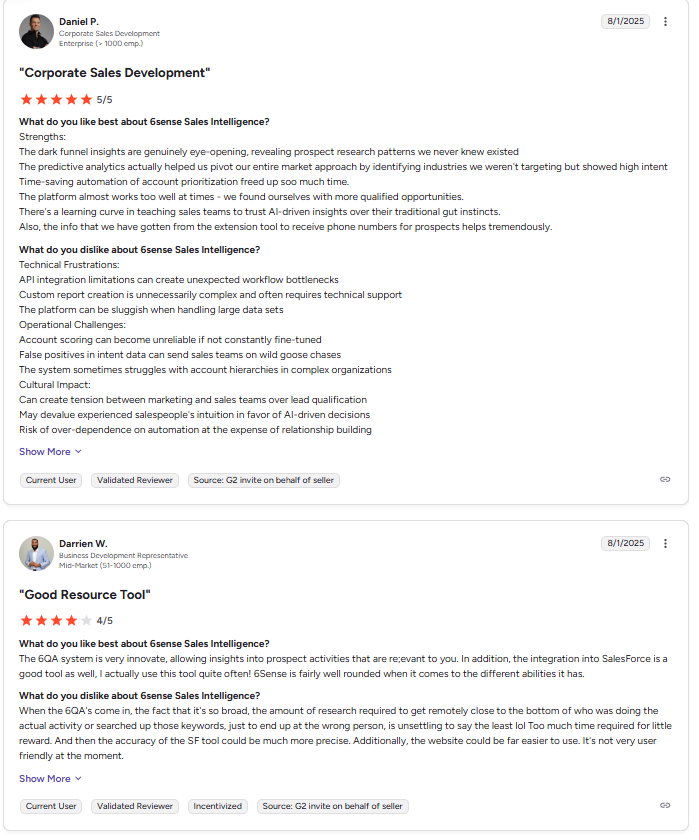
Customers have liked 6sense for its deep insights and automation features. One user really appreciates the dark funnel insights, predictive analysis, and the helpful automation of account prioritization, but they also mention that the API integrations are limited and the custom report creation feature is very complex. The platform has a G2 rating of 4.0/5 stars.
4. Cognism

Cognism is a B2B sales intelligence platform that helps revenue teams by providing access to a global database of contacts and companies. It also provides specific tools like intent data and data enrichment for outreach and engagement that help businesses find accurate contact info without the risk of increased bounce rates.
What makes it popular
- Has a flat platform fee with no restrictions on data usage.
- Uses AI for lead generation
- Diamond Data® phone-verified contacts
- Complies with GDPR and CCPA
- Automates prospecting workflows
Key features
- Global B2B database of contacts and companies.
- Browser extension and list-building web app.
- Phone-verified mobile numbers and intent data.
- Advanced filtering and search capabilities
- Intent data signals
- Predictive lead scoring
- Data cleansing and verification
- Data-as-a-Service to provide access to verified B2B data in real time
Pros
- Unlimited data access
- Integration with popular sales tools like Salesforce and HubSpot
- Easy to use
Cons
- Pricing details are not publicly available.
- High cost for startups
- Initial setup and learning curve for new users
Pricing
The pricing plans of Cognism are listed below.
- Grow plan: The Grow plan of Cognism has custom pricing depending on business size and team needs. It includes features like the Prospector tool, Chrome extension, CRM integrations, and basic data enrichment.
- Elevate plan: The Elevate plan of Cognism has custom pricing that depends on enterprise requirements. It includes all Grow plan features along with intent data, advanced enrichment, dedicated account manager, onboarding support, and compliance assistance.
Customer support
Cognism provides support through live chat and also offers onboarding assistance.
Customer reviews
Cognism is reviewed very positively for making prospecting straightforward and effective. One user mentions that the Chrome extension allows them to find email addresses and mobile phone contacts of professionals quickly.
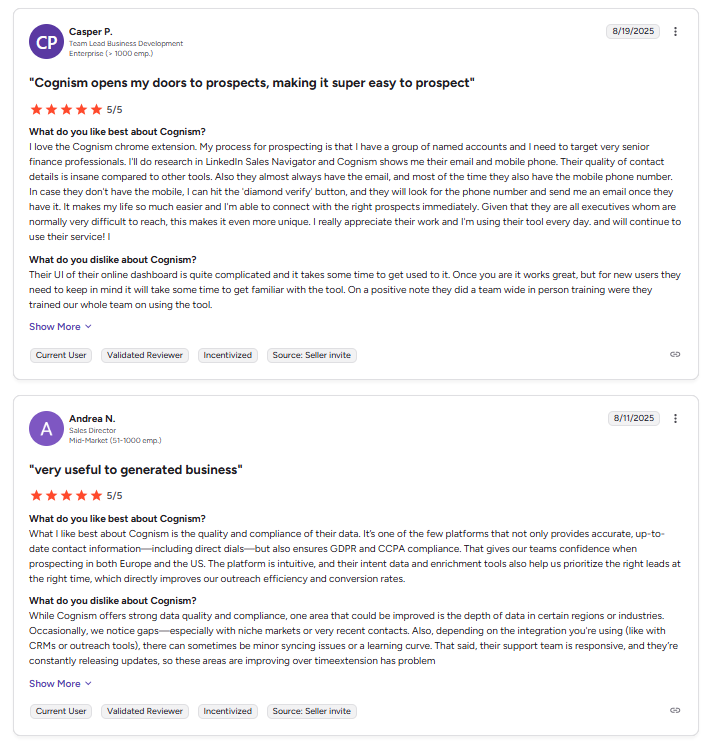
Another user praises Cognism for the quality and compliance of its data, as it provides accurate and up-to-date contact information with GDPR and CCPA compliance. The platform has a G2 rating of 4.6/5 stars.
5. LinkedIn Sales Navigator

LinkedIn Sales Navigator is a B2B sales tool that can scan LinkedIn's professional network to help users find and engage with potential leads. This B2B tool helps users instantly find relevant contact data for a LinkedIn profile while they are simply browsing the web.
What makes it popular
- Provides access to LinkedIn's extensive database of professionals.
- Offers advanced search filters for precise targeting.
- Gives real-time profile and company updates
- Personalized lead recommendations
Key features
- Advanced lead and company search capabilities.
- InMail messaging capability
- Real-time insights and updates on leads.
- TeamLink for shared connections
- Lead and account alerts
- CRM integration with platforms like Salesforce and Microsoft Dynamics.
Pros
- Real-time updates on leads and companies.
- Identify decision-makers quickly
Cons
- Higher pricing compared to some competitors.
- Limited CRM integration
Pricing
- Core: The Core plan of Sales Navigator starts at $99.99 per month and includes advanced search filters, lead recommendations, and 50 InMail messages per month.
- Advanced: The Sales Navigator Advanced plan starts at $149.99 per month and includes team collaboration tools, CRM integration, and advanced reporting.
- Advanced Plus: The Sales Navigator’s Advanced Plus plan offers custom pricing and includes enterprise-level features, including CRM sync and advanced analytics.
Customer support
LinkedIn Sales Navigator offers support through their Help Center, email, and live chat.
Customer reviews
LinkedIn Sales Navigator receives great feedback for its access to a large professional network and advanced search capabilities. One user appreciates the smart lead tracking and collaborative features that help users stay organized, and how well it integrates with Microsoft Dynamics or Salesforce.
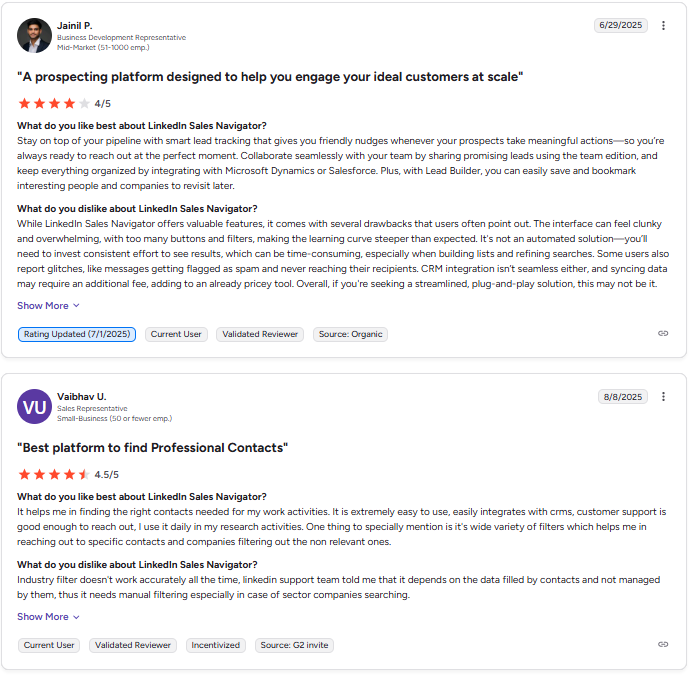
Another user praises LinkedIn Sales Navigator for helping find the right contacts easily and mentions its wide variety of filters that improve targeting by removing irrelevant contacts. They find it easy to use with good customer support. The platform has a G2 rating of 4.3/5 stars.
6. Apollo.io

Apollo.io is a data intelligence and sales engagement platform that offers a vast B2B contact database with over 200 million contacts. It also offers tools like a Chrome extension for finding contacts to increase outreach and engagement for businesses.
What makes it popular
- Has an extensive database with over 250 million contacts.
- Offers integrated tools like verified email/phone number lookup and sequencing analytics for email-finding and analytics tracking.
- Has affordable pricing plans suitable for various business sizes.
Key features
- Sequencing tools for multi-channel outreach with built-in automation.
- Conversation intelligence with call recording and coaching features.
- Engagement analytics that track open rates, click-through rates, and response rates
Pros
- User-friendly interface.
- Detailed contact database.
- Generous free plan
- Transparent pricing
Cons
- Occasional data inaccuracies.
- Limited third-party integrations
Pricings
- Free plan: The Free plan includes 100 credits per user per month with 2 sequences, Prospecting, Gmail, and Salesforce extension, and basic filters.
- Basic plan: The Basic plan starts at $59 per user per month if billed annually. It includes all features of the Free plan, plus 2500 credits per user per month, advanced filters, CRM integration, scheduling meetings, 6 intent topics, intent filtering, and enrichment for data and CRM.
- Professional plan: The Professional plan starts at $79 per month and includes 4,000 credits per user per month, unlimited sequences, Gmail extension, automated workflows, and AI research intelligence.
- Organization plan: The Organization plan starts at $119 per month and includes 6,000 credits per user per month, 12 intent topics and intent filters, enrichment for data and CRM, customizable reports and dashboards, and advanced security configurations.
Customer support
Apollo.io offers support through email, phone, chat, and its website’s Help Center.
Customer reviews
Users appreciate Apollo.io for its enrichment tools, seamless integration capabilities, and user-friendly interface. One user appreciates the browser plugin that helps find contact info from LinkedIn profiles and lets them enroll contacts into sequences without leaving the site, but they find the AI-powered tools limiting, because users must rely only on Apollo's AI.

Another user mentions the high-quality B2B leads and how helpful the database’s large size and granular search filters are. The platform has a G2 rating of 4.7/5 stars.
7. Seamless.AI

Seamless.AI is a real-time search engine for B2B sales leads that uses artificial intelligence to help users find and connect with potential leads. It offers automated lead generation features like real-time email verification and bulk data enrichment, which help users save hours when building and refining prospect lists.
What makes it popular
- AI-driven data accuracy
- Integration with platforms like LinkedIn and Salesforce.
- Real-time search engine for contacts
Key features
- Real-time contact data search.
- Email Finder Chrome extension.
- CRM and automation integrations.
Pros
- User-friendly interface
- Extensive database of leads
- Advanced search and filtering capabilities
Cons
- Occasional inaccuracies in contact information
- Expensive for smaller businesses
Pricing
- Free plan: The free plan includes 50 lifetime credits, 1 user seat, email and phone contact search, real-time search engine, and access to the knowledge base.
- Pro plan: The Pro plan’s exact cost is not publicly available, but it includes a daily credit refresh with email support, premium integrations, and weekly live training webinars. This plan’s cost varies per user and includes a daily credit refresh.
- Enterprise plan: The Enterprise plan offers custom pricing and includes unlimited team seats, custom daily credits, a dedicated account manager, enhanced analytics, phone support, and quarterly business reviews.
Customer support
Seamless.AI provides support through a help center, email, and live chat. They also offer training resources and tutorials.
Customer reviews
Users give positive feedback to Seamless.AI for its ease of use and updated database. One user appreciates the regularly updated data that helps their team achieve sales goals more efficiently, and also praises Seamless.AI’s helpful sales representatives.

Another user praises the quality of data that has led their team to have meaningful conversations with decision-makers, but they also mention that the accuracy of email addresses can vary. The platform has a G2 rating of 4.4/5 stars.
8. Lusha

Lusha is an AI sales intelligence software that offers accurate contact details to help B2B sales and marketing teams. This B2B data provider helps sales teams increase their lead generation, manage their workflows better, and improve their sales strategies.
What makes it popular
- Offers a user-friendly interface with a quick setup.
- Provides a Chrome extension for easy data extraction.
- Offers affordable pricing plans for small- to medium-sized businesses.
Key features
- Access to over 20 million verified contacts.
- Real-time contact and email data verification.
- GDPR-compliant data handling
Pros
- Easy to use and quick access to contact info
- Great integration with popular CRMs like Salesforce and HubSpot
Cons
- High pricing plans for advanced features
- Limited data coverage for smaller companies
Pricing
- Free plan: The free plan starts at $0 per month and offers 40 credits with limited features. It allows access for 1 user and does not require a credit card.
- Pro: The Pro plan starts at $29.90 per month if billed annually and provides a minimum of 250 credits per month with data enrichment features and API integrations.
- Premium: The Premium plan starts at $69.90 per month if billed annually and offers a minimum of 600 credits per month with advanced usage analytics and a higher number of bulk lookups.
- Scale: The Scale plan offers custom pricing based on team size, number of credits required, and type of features needed.
Customer support
Lusha offers support through email and a help center on their website. They also provide onboarding resources and tutorials to guide new users.
Customer reviews
Lusha receives positive feedback for its ease of use, advanced search filters, and the efficiency of its Chrome extension. One user appreciates the helpful search filters like job title, industry, company size, and the intent data to identify companies actively looking for a solution, but they also mention the limited data coverage for niche markets.

Another user says that Lusha provides all types of contact information for sales prospects, company history, and company background seamlessly, which is helpful for marketing communication. The platform has a G2 rating of 4.3/5 stars.
9. Hunter.io

Hunter.io is an email outreach platform that helps users find and verify professional email addresses from websites and LinkedIn profiles. It can provide instant access to publicly available contact data and verify it in real time. Hunter uses a combination of proprietary technology and artificial intelligence to find, verify, and enrich contact details.
What makes it popular
- Has a user-friendly interface with straightforward tools.
- Offers a free plan that is suitable for individuals and small businesses.
- Provides email verification to reduce email bounce rates.
Key features
- Locates professional email addresses by name and domain.
- Confirms the validity of email addresses.
- Sends and manages email campaigns directly from the platform.
Pros
- Simple and intuitive to use.
- Offers a generous free plan.
Cons
- Limited features compared to other detailed sales intelligence platforms.
Pricing
- Free plan: The Free plan costs $0 per month and provides access to 50 monthly credits, basic B2B database filters, connection with 1 email account, 500 recipients per campaign, unlimited team members, and regular support.
- Starter plan: The Starter plan starts at $34 per month and includes 2,000 monthly credits, auto verification, lead enrichment, connection with 3 email accounts, an AI writing assistant, 2,500 recipients per campaign, unlimited team members, and priority support.
- Growth plan: The Growth plan starts at $104 per month and includes 10,000 monthly credits, all features of the Starter plan, connection with 10 email accounts, and 5,000 recipients per campaign.
- Scale plan: The Scale plan starts at $209 per month and includes 25,000 monthly credits, all features of the Growth plan, connection with 20 email accounts, and 15,000 recipients per campaign.
- Enterprise plan: The Enterprise plan offers custom pricing based on the number of credits required and has all the features included in the scale plan, a personal account manager, and a custom number of connected email accounts.
Customer support
Hunter.io offers support through their Help Center, email, and live chat.
Customer reviews
Users give positive feedback to Hunter.io for its simplicity and effectiveness in finding and verifying emails. One user mentions that Hunter is cost-effective and easy to use, which allows them to automate cold email campaigns quickly, but they also mention that some CRM integrations are missing.

Another reviewer notes that the tool is best for finding email addresses, and they really appreciate the accuracy of the contact information. The platform has a G2 rating of 4.4/5 stars.
10. Kaspr

Kaspr is a prospecting tool and a LinkedIn Chrome extension that helps businesses find accurate B2B contact information like emails and phone numbers directly from LinkedIn profiles. It can provide real-time data verification, so it is a fast and reliable option for SMBs, sales, and recruitment teams.
What makes it popular
- Provides seamless integration with LinkedIn using the Chrome extension.
- Provides real-time access to accurate European contact data for over 200 million profiles.
- Has a user-friendly interface suitable for both individuals and teams.
- Has affordable pricing plans, including a free trial.
Key features
- LinkedIn Chrome extension for direct contact-finding
- Bulk lookup capabilities.
- CRM integrations with platforms like HubSpot and Salesforce.
- Team collaboration tools with shared credits.
Pros
- Accurate and up-to-date contact information.
- Easy to set up and use without extensive onboarding.
- Flexible pricing suitable for various business sizes.
Cons
- Limited phone and direct email credits on the free plan.
- Limited bulk lookup capabilities.
Pricing
- Free plan: The Free plan of Kaspr includes 15 B2B email credits, 5 phone credits, and 5 direct email credits.
- Starter plan: The Starter plan starts at €45 per month per user and offers unlimited B2B email credits, 1,200 phone credits, and 60 direct email credits.
- Business plan: The Business plan starts at €79 per month per user and provides 2,400 phone credits, 2,400 direct email credits, and 12,000 export credits.
- Enterprise plan: The Enterprise plan offers custom pricing with advanced features and higher limits.
Customer support
Kaspr offers support through email at [email protected] and provides a Help Center on their website with articles and guides to assist users.
Customer reviews
Kaspr has received positive customer reviews for its ease of use and the accurate data it provides. One user mentions that Kaspr makes it easy to extract verified contact details from LinkedIn, but they wish the availability of phone number data were better.

Another user appreciates how seamlessly the tool works as it pops up on the side of their screen while they are looking for new leads. The platform has a G2 rating of 4.4/5 stars.
11. Lead411

Lead411 is a powerful B2B lead generation and sales intelligence platform that offers verified contact information, such as emails and phone numbers. It helps businesses identify and connect with potential leads and improve their outreach. Lead411 helps sales teams, marketers, and business development professionals build pipelines, close deals, and scale outreach efforts efficiently.
What makes it popular
- Provides verified contact data with high accuracy.
- Provides a user-friendly interface.
- Offers affordable pricing plans.
Key features
- Access to over 450 million B2B contacts.
- Email and phone number verification.
- CRM and outreach integrations with platforms like HubSpot and Salesforce.
- Buyer intent data
- A Chrome extension
- CRM Enhancer
- Sales Intelligence API
- Sales Intelligence Alerts
Pros
- High data accuracy
- Easy to navigate and use
Cons
- Very basic contact information with limited data depth
Pricing
- Free trial: The free trial offers 50 exports for 7 days and charges $0.50 for each additional export.
- Basic Plus Unlimited: The Basic Plus Unlimited plan has custom pricing and offers 10,000 exports per year with unlimited email and phone number lookups.
- Enterprise Limited: The Enterprise Limited plan offers custom pricing that depends on the features chosen.
Customer support
Lead411 offers support through email and phone numbers shown on their website, and their Help Center.
Customer reviews
Users commend Lead411 for its data accuracy, affordability, helpful customer support, and simple user interface. One user mentions that the data accuracy is better than many other platforms they have used before, and the customer support was highly cooperative.
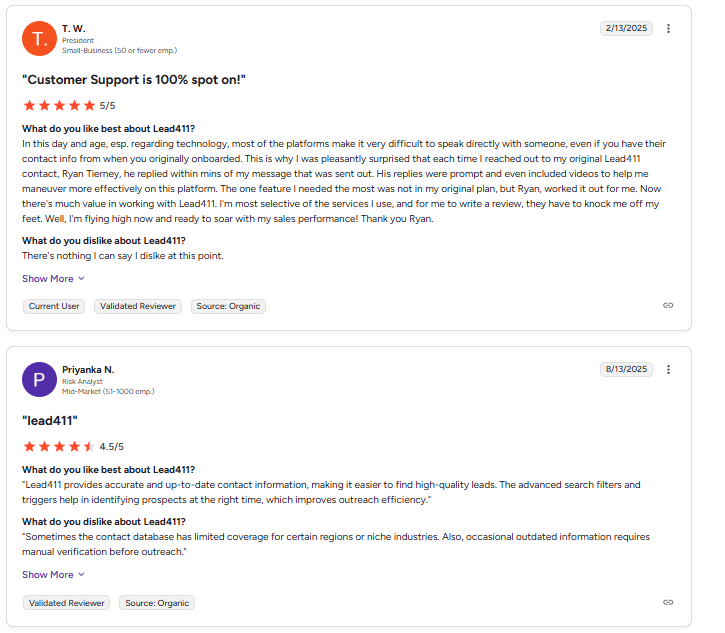
Another user says that the accurate and up-to-date contact information makes it easy to find high-quality leads, but the contact database has limited coverage for certain regions or niche markets. The platform has a G2 rating of 4.5/5 stars.
12. LeadIQ

LeadIQ is a B2B sales prospecting tool that helps sales teams capture and improve contact data and leads quickly. LeadIQ is the modern prospecting hub for optimized pipeline generation. It provides access to data for over 749 million contacts while helping businesses fill their pipeline with quality opportunities.
What makes it popular
- Provides helpful triggers like funding, hiring, and news.
- Imports data from LinkedIn to any CRM in a few clicks.
Key features
- Contacts with direct dials
- Buyer intent and triggers
- Lead capture and enrichment
- Strong CRM integration and data syncing across your tech stack
- AI-powered account prospecting
Pros
- Reduces manual work.
- Good for outbound teams.
Cons
- Data accuracy depends on the sources.
- Limited built-in engagement tools.
Pricing
- Free plan: The free plan offers 50 free credits and all basic features like CRM integration and list exporting.
- Pro plan: The Pro plan costs $15 per month and provides 200 monthly credits with access to all basic features.
- Enterprise plan: The Enterprise plan offers all the advanced features like Salesforce duplicate detection and team analytics dashboards, with custom pricing that depends on the number of credits needed.
Customer support
LeadIQ offers strong customer support through email and phone, and also has a dedicated section to guide new users. LeadIQ also provides eBooks and conducts dedicated webinars on its LeadIQ Academy to provide more help and information to its users.
Customer reviews
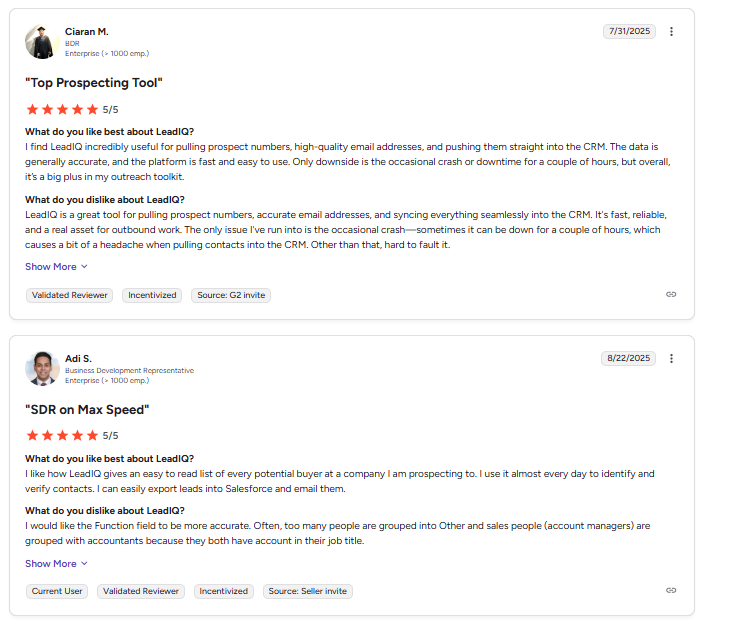
LeadIQ receives positive feedback for its high-quality contact information and easy CRM integration. One user mentions that LeadIQ is great for pulling prospect numbers, high-quality email addresses, and pushing them straight into the CRM. They also appreciate the data accuracy and say that the platform is fast and easy to use. LeadIQ has a G2 rating of 4.2/5 stars.
13. SalesIntel

SalesIntel is a pipeline generation platform that combines AI with human-verified contact data to help GTM (Go-to-Market) teams identify and connect with potential leads. This allows users to easily find accurate emails and phone numbers to reach out to their potential leads.
What makes it popular
- Provides human-verified data.
- Offers regular data re-verification every 90 days.
- Provides access to over 20 million companies and 14 million contacts.
Key features
- Firmographic analytics and data.
- CRM automation and data organization.
Pros
- High-quality and accurate data.
- Excellent customer support.
Cons
- Smaller database compared to some competitors.
- No transparency in pricing details
Pricing
SalesIntel offers customized pricing based on the specific needs of your business and the features you need.
Customer support
SalesIntel provides support through email, phone, and a detailed Help Center on its website.
Customer reviews
Users appreciate SalesIntel for its accurate data and excellent customer support. One customer appreciates the accurate and up-to-date technographic data on the website. They also mention that the user interface is easy to learn and navigate, but wish that the platform allowed direct enrichment of intent data.
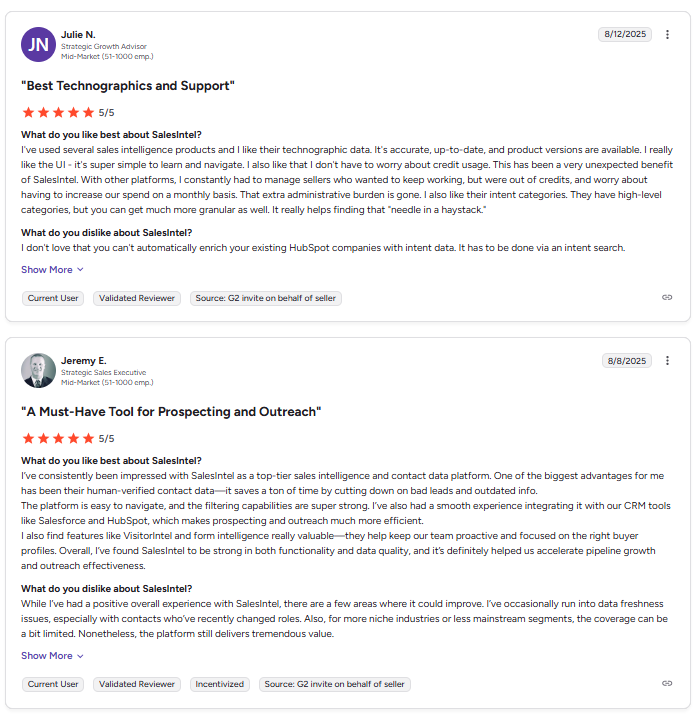
Another user praises SalesIntel for its human-verified contact data and the smooth experience they had integrating it with CRM tools like Salesforce and HubSpot. The platform has a G2 rating of 4.3/5 stars.
14. Salesgenie
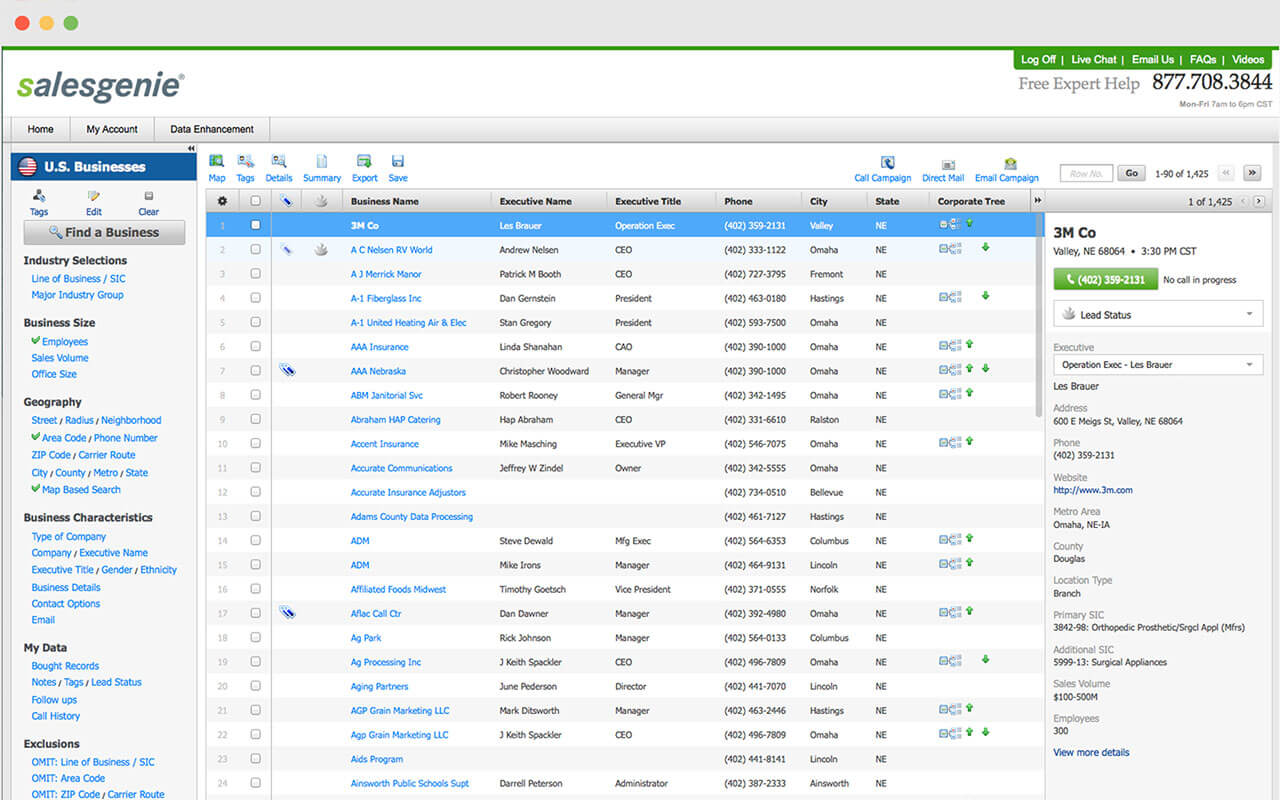
Salesgenie is an all-in-one sales intelligence and marketing platform that provides businesses with high-quality data and advanced prospecting capabilities to identify and connect with potential leads.
What makes it popular
- User-friendly interface
- 50+ years of combined industry and marketing experience
- A mobile app allows users to access real-time data and manage their sales pipelines
- 300 full-time researchers verify and update the database
Features
- Buyer intent data to identify potential business buyers quickly
- 24 million verification calls annually to keep data updated
- Data Enhancement feature to update and add missing information, such as email addresses, mailing addresses, phone numbers, and geographic information
- A Customer Data tool to allow users to match their customer data with the platform’s existing data
- CRM integration with Salesforce and Microsoft Dynamics
- Salesgenie Dialer™ to easily set up calls and conduct campaigns using business data
Pros
- Help sales teams spend less time chasing cold prospects and more time closing leads
- Allow small businesses to access expertly designed templates and campaign support
- Provides a dedicated account representative to enterprises for personalized onboarding and training to help their staff get started.
Cons
- Filtering issues
- Limited contact information
- Lead management issues like duplicate leads and outdated contact information
- Poor lead quality with duplicates and outdated contacts
Pricing
- Basic: The Basic plan of Salesgenie costs $99/month and allows users to add any number of monthly credits to their subscription at any time. It gives access to 1 user and provides contact information, performance tracking, a mobile app, lead management, and customer profile analysis. This plan allows users to add buyer intent data for an additional $39/month.
- Pro: The Pro plan of Salesgenie costs $149/month and gives access to 1 user. It provides all features of the Basic plan, plus uses credits for exports, email addresses, email marketing, and direct mail marketing. It also allows users to add buyer intent data for $39/month.
- Team: Salesgenie’s Team plan costs $299/month and gives access to 5 users. It includes all features of the Pro plan and allows users to add buyer intent data for an additional $39/month.
Customer support
Salesgenie provides customer support to its users through live online chat, email, and phone support.
Customer reviews

G2 gives Salesgenie 4.4 stars, and users like it for its in-depth search capabilities by company size, vertical, and location, which provide accurate and up-to-date information and help them with successful cold calling. They appreciated the ability to store follow-up information within the system to improve efficiency without needing to transfer data.
15. UpLead

UpLead is a B2B contact-finding platform that gives users access to a massive database of over 160 million contacts with verified emails. It is known for its high accuracy and supports advanced filtering by criteria, such as industry, job title, and location.
What makes it popular
- Provides phone numbers and emails from LinkedIn profiles.
- Offers a Chrome extension with instant data extraction.
- Provides access to over 160 million contacts through their Prospector tool.
Key features
- Real-time email verification.
- Enriches the database by refreshing outdated, missing, and inaccurate data
- Accurately enrich companies and contacts information using their API.
- Prospecting using 27,000 technology data points
- Email finder tool
- Use Intent Data to generate lists of engaged leads, segment and prioritize them, and approach them at the right moment, with the right message.
Pros
- High lead accuracy.
- Easy to use.
- Affordable pricing plans.
Cons
- Smaller database than some competitors.
Pricing
- Free trial: The free trial of UpLead lasts 7 days and provides 5 credits per user with access to a Chrome extension.
- Essentials: Starts at $99 per month and offers 170 credits for finding phone numbers and emails with CRM integration.
- Plus: Starts at $199 per month and offers 400 credits for finding phone numbers and emails with advanced filters and technographics features.
- Professional: This plan has custom pricing and credit amounts based on company requirements.
Customer support
UpLead offers support through email and a detailed Help Center on its website. They also offer a toll-free support line along with dedicated channels for each type of query, such as General inquiries, Sales inquiries, and Help & Support.
Customer reviews
Users really like UpLead for its high-quality leads and real-time email verification. One user mentions that the lead quality is excellent and the bounce rates are minimal, which saved their team a lot of money during their outreach, but they found the search system in the database slightly complex to learn.
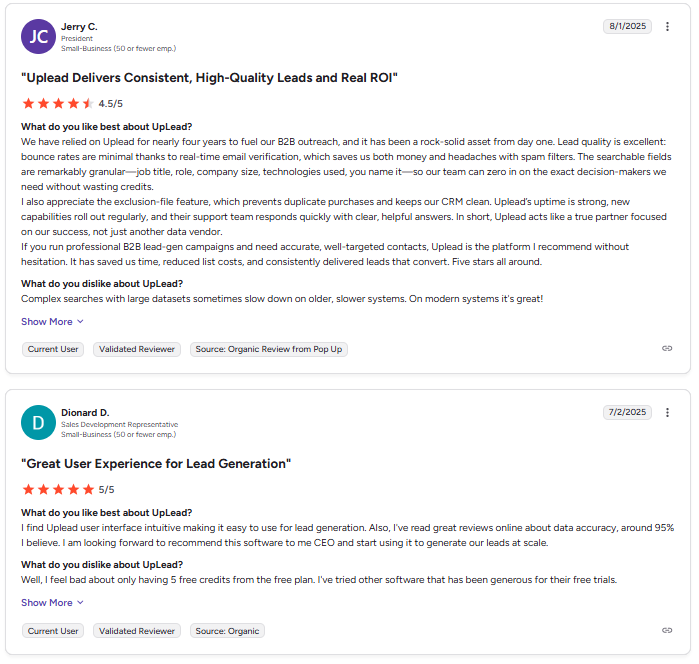
Another user appreciates Uplead for the easy and simple user interface and the data accuracy from real-time verification. The platform has a G2 rating of 4.7/5 stars.
16. Crunchbase

Crunchbase is a B2B marketing tool that provides insights into startups, funding rounds, and company growth. CrunchBase helps sales and marketing teams find new outreach opportunities and track industry trends.
What makes it popular
- Helps businesses find funding information, deals, and company data.
- Provides predictive company intelligence.
Key features
- Huge database of companies and startups.
- Funding and investor details.
- Search filters for industries, regions, and company size.
- Custom alerts for company updates.
Pros
- Great for market research.
- Easy to find funding and investor details.
- Clean and simple interface.
Cons
- Limited free version.
- Some data can be outdated or incomplete.
- Advanced search features are only available in paid plans.
Pricing
- Free plan: The free plan offers limited search and company profile access and is only suitable for casual users for 7 days.
- Pro plan: The Pro plan costs $49 per month if billed annually and $99 per month if billed monthly. This plan is designed for professionals who need advanced search filters, tracking, and alerts to find new leads and monitor markets.
- Business plan: The Business plan costs $199 per month and is designed for large teams and organizations that need bulk data and deep integrations.
- API plan: The API plan offers advanced API integrations and has custom pricing based on the selected features.
Customer support
The customer support of Crunchbase is responsive and available via email and the help center.
Customer reviews
Crunchbase is positively reviewed for its simple user interface and accurate contact information. One user mentions that Crunchbase provides helpful information when trying to find out about a company, and the user interface is very easy to navigate.
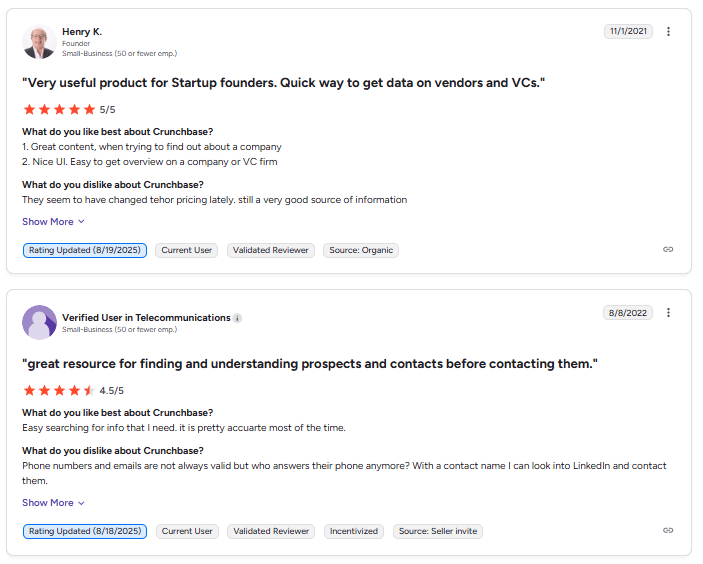
Another user appreciates the ease of searching for contacts, but they also mention that phone numbers and email addresses are not always valid. This B2B platform has a G2 rating of 4.5/5 stars.
17. RocketReach

RocketReach is a lead and sales intelligence platform that helps users find emails and social media links for professionals across various industries like finance, tech, and healthcare. It has a large database with access to over 700 million contacts.
What makes it popular
- Data-driven decision-making
- Provides a user-friendly interface with quick search capabilities
- Provides detailed candidate profiles for recruiters
- Access to over 700 million professionals
Key features
- Create custom prospect lists with the help of AI
- Email and phone number lookup.
- Email Finder Chrome extension
- Creates automated workflows to discover and engage with prospects through Autopilot
- Allows users to email prospects without switching tools, automate short sequences, and craft compelling messages faster with AI Writer
- Email verification tool
- Organize contacts with tags
- Integration with CRMs like Salesforce, HubSpot, Outreach, Bullhorn, and Salesloft
Pros
- Increases customer discovery for businesses up to 50%
- Easy to use
- Generates a stronger ROI for all sizes of businesses
Cons
- Limited advanced features compared to competitors.
Pricing
- Essentials: The Essentials plan of RocketReach starts at $329 per year and offers 1,200 annual lookups and exports.
- Pro: The Pro plan of RocketReach starts at $829 per year and offers 3,600 annual lookups and exports.
- Ultimate: The Ultimate plan of RocketReach starts at $2,099 per year and offers 10,000 annual lookups and exports.
Customer support
RocketReach offers support through live chat with an agent, email at [email protected], and phone support through an account manager.
Customer reviews
Users give positive reviews of RocketReach for its ease of use and extensive database. One user mentions that it is an excellent resource for finding email addresses, but some email addresses end up being outdated or invalid.
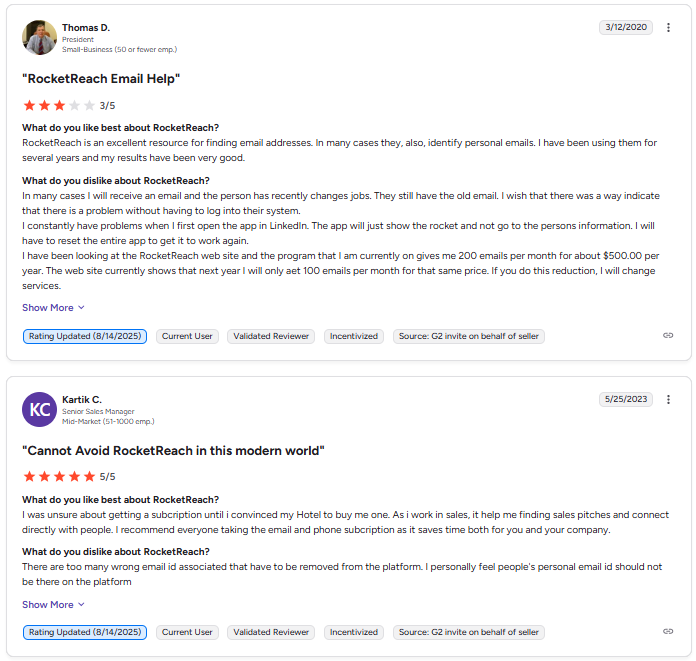
Another user appreciates how easy it is to reach out with sales pitches and connect directly with people through RocketReach. The platform has a G2 rating of 4.4/5 stars.
What are the tips for choosing ZoomInfo competitors?
The tips for choosing ZoomInfo competitors include matching your budget, prioritizing data accuracy, evaluating data coverage, checking integration capabilities, and analyzing customer support.
The best tips for choosing ZoomInfo competitors are described below.
- Matching your budget: Matching your budget means businesses should pick a platform that fits their business size and budget. They must consider the total cost, which includes subscription fees, user licenses, and hidden charges. Companies also need to compare the pricing tiers with other providers to find the best tool for their business size, growth plans, and required features.
- Prioritizing data accuracy: Prioritizing data accuracy means that businesses need to make sure that they are targeting the right prospects with up-to-date contact and company information. They must choose a provider who offers a regularly refreshed database, uses verified sources to collect data, and has minimal email bounce rates. Inaccurate data results in wasted outreach efforts, reduced campaign effectiveness, and lower ROI.
- Evaluating coverage: Evaluating coverage means that you need to confirm that the platform has strong global or regional data coverage across industries, geographies, and company sizes. They should evaluate whether the platform includes firmographics, technographics, and intent data relevant to their target market.
- Checking integration capabilities: Checking integration capabilities means that businesses need to make sure that the provider’s platform integrates smoothly with the existing tech stack, such as CRM systems, marketing tools, and sales automation software. Good integration helps companies simplify workflows, improve data syncing, and increase their productivity.
- Analyzing the customer support: Analyzing customer support means that the platform should offer reliable customer support for onboarding and troubleshooting. Look for a provider that offers 24/7 assistance, onboarding services, training resources, and responsive account management.
What is ZoomInfo?
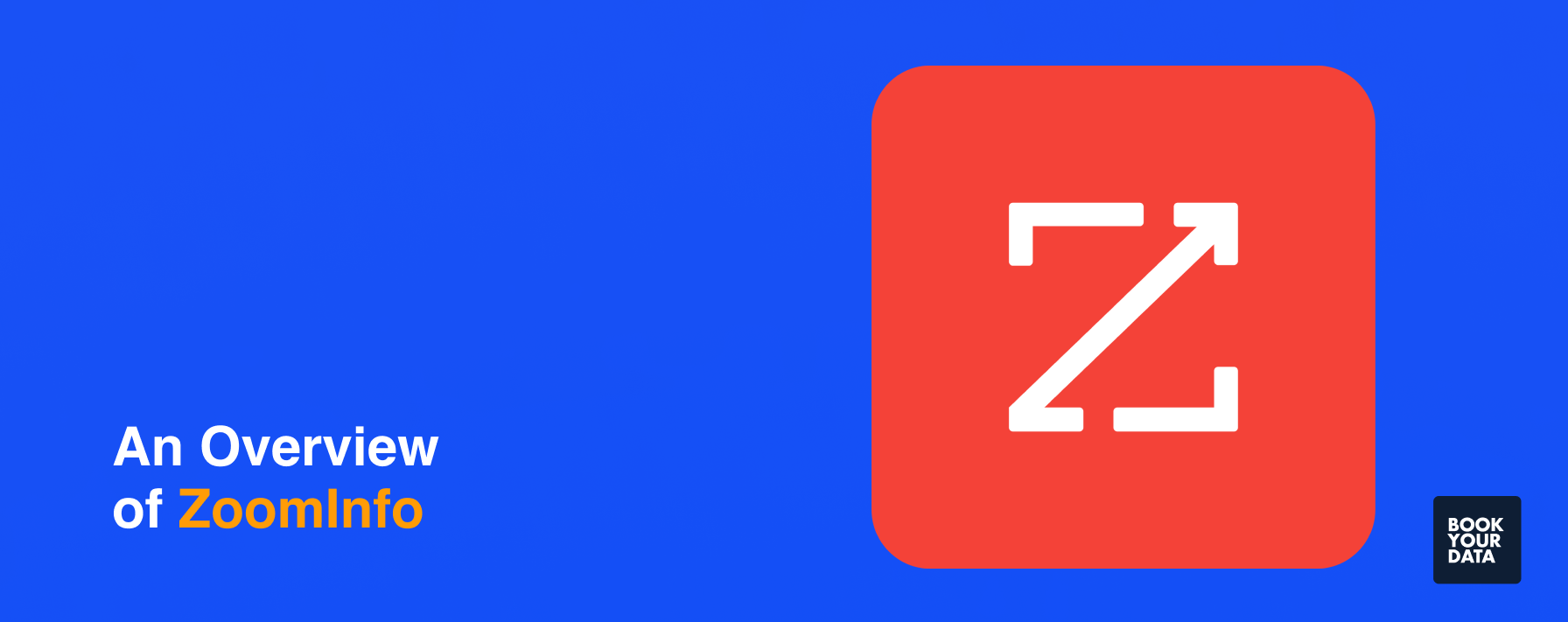
ZoomInfo is a B2B sales intelligence and GTM (Go-to-Market) platform that helps businesses find and connect with more customers by providing accurate contact data, company insights, and sales intelligence tools. Sales, marketing, and recruitment teams use ZoomInfo to access verified business data for prospecting, lead generation, and market research.
ZoomInfo is a legit platform that is trusted by many businesses worldwide as it complies with data protection regulations like GDPR and CCPA. It has a ZoomInfo Chrome extension that allows users to instantly view and capture company and contact details while browsing LinkedIn or company websites.
How does ZoomInfo collect data?
ZoomInfo collects its data from public records, business websites, advanced technologies, niche third-party providers, community contributors, and an advanced research team. It then verifies that data through a multi-layered, real-time verification process using NLP (Natural Language Processing), AI (Artificial Intelligence), ML (Machine Learning), and highly skilled data scientists. It also constantly refreshes its data by testing, updating, and monitoring every data point. This B2B platform adjusts, adds, or removes the information if it detects a data change.
How much does ZoomInfo cost?
ZoomInfo costs between $14,995 and $39,995, depending on the package and features you choose. The pricing plans of ZoomInfo are all yearly subscriptions and include the Lite plan (free), the Professional plan, the Advanced plan, and the Elite plan.
BookYourData is the best ZoomInfo alternative

BookYourData is the best alternative to ZoomInfo if the company needs a faster and more accurate B2B contact data platform. ZoomInfo requires long-term contracts and yearly subscriptions with different pricing tiers and hidden costs, while BookYourData has a simple pay-as-you-go model where you only pay for the data you need.
BookYourData also provides real-time email verification and a 97% data accuracy rate to help users avoid wasting money on outdated or invalid contacts. It allows businesses to instantly filter and download targeted leads by job title, industry, location, or company size without any subscriptions or commitments.
Features
- Allows users to buy email lists with custom filters.
- Provides real-time email verification and deliverability guarantee.
- Allows direct CRM and marketing tool integrations.
- Allows search filters like industry, job title, location, company size, and more.
- Web-based, so no need for browser extensions.
- Offers clean and GDPR-compliant datasets.
Pricing
- Free plan: The free plan is best for trying out the tool as it offers 10 free credits, with no subscription or credit card required, and includes access to all features.
- Pay-as-you-go pack: The pay-as-you-go plan of BookYourData starts from $99 and offers $0.40 per credit. A single credit is required to get one contact, and the credits never expire. This pricing plan does not require long-term commitments.
G2 comparison of the best ZoomInfo competitors
Below is the G2 comparison of the best ZoomInfo competitors, which include Apollo.io, BookYourData, and Lusha.
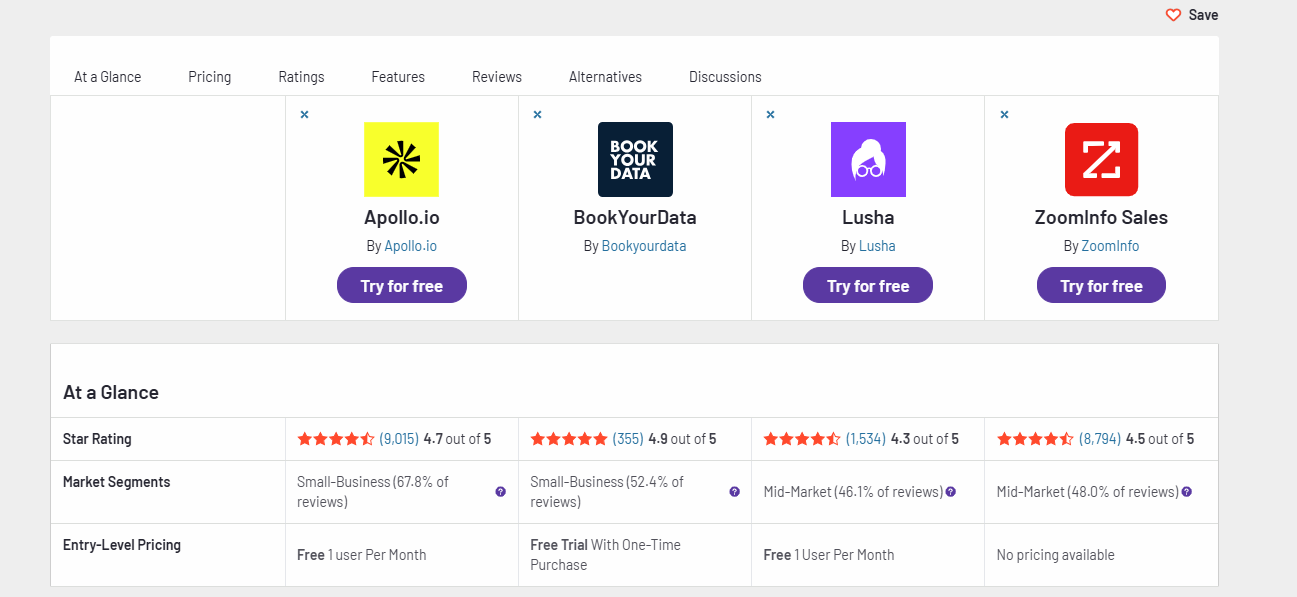
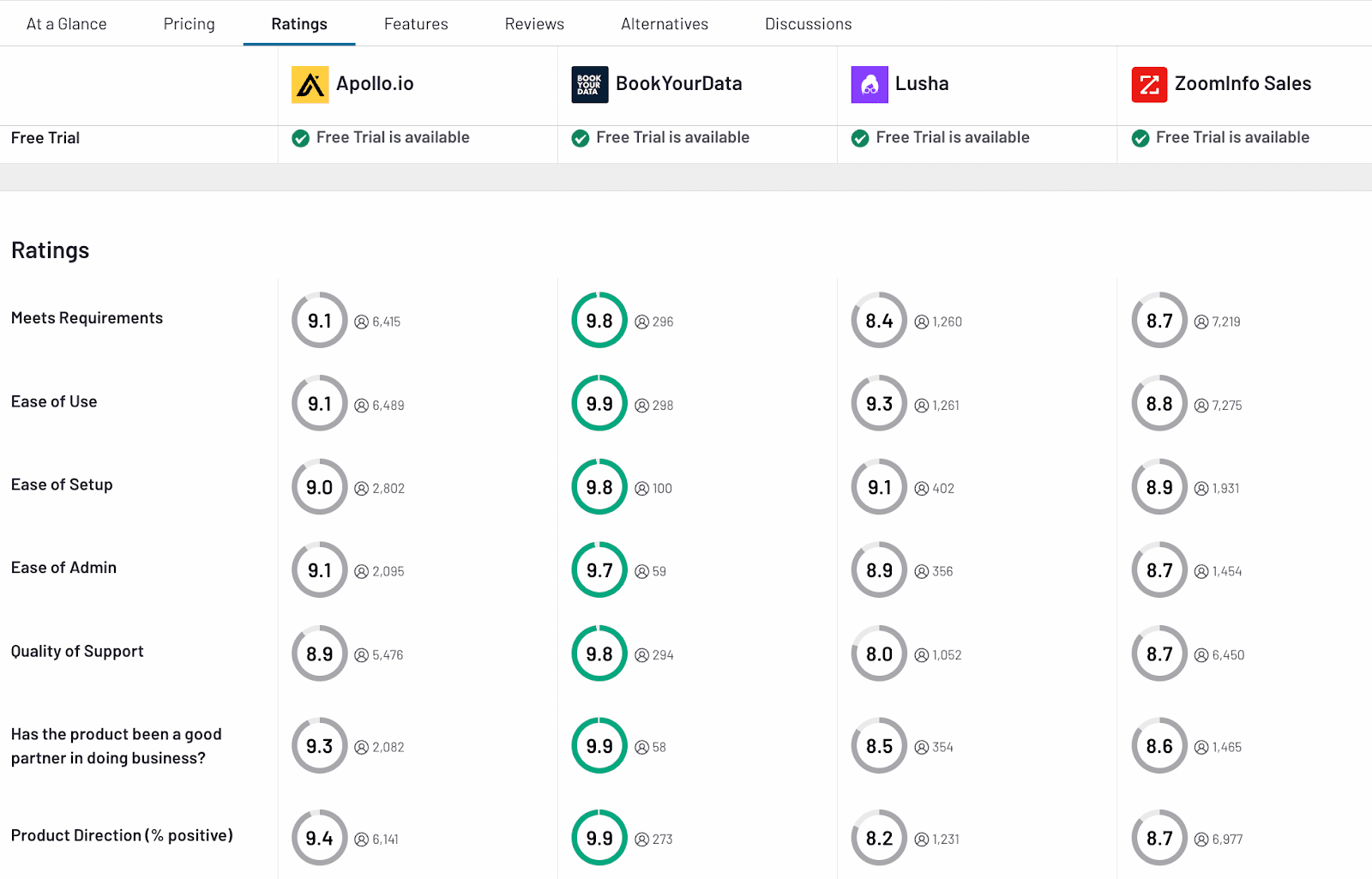
Source: https://www.g2.com/compare/apollo-io-vs-bookyourdata-vs-lusha-vs-zoominfo-sales
ZoomInfo offers extensive firmographic, intent, and enrichment data with powerful search filters and deep CRM integrations. Apollo includes a massive contact database and built-in sales engagement tools, like omni-channel sequences, call coaching, calendar insights, and workflow automation. BookYourData delivers highly accurate contact and company details, with real‑time email verification, technographics, bulk enrichment, API access, and live‑chat support. Lusha offers a browser extension, CRM enrichment, contact lookup, intent/job‑change filters, and real‑time verification.
How to choose the best ZoomInfo competitor for your business?

To choose the best ZoomInfo competitor for your business, you need to consider some important factors like pricing, data accuracy, and flexibility.
Choose a ZoomInfo competitor with transparent, flexible pricing that fits your budget. A good platform does not charge hidden fees for extra features or users, as BookYourData offers transparent pricing and uses a pay-as-you-go model to help users maximize ROI.
Select a ZoomInfo competitor that offers real-time verification and human validation to reduce bounced contacts and improve outreach success.
Verify that your selected ZoomInfo competitor provides customizable search filters, seamless CRM integrations, and tools according to your specific sales workflows and geographic focus.
What are the main differences between ZoomInfo and Lusha in terms of lead generation and pricing models?
The main differences between ZoomInfo and Lusha in terms of lead generation capabilities and pricing models lie in their database size and subscription plans. ZoomInfo provides a massive database of over 230 million contacts and has expensive pricing plans that start around $15,000 per year. Lusha offers direct contact details such as emails and phone numbers with a smaller database, and its pricing plans start at around $29.85 per month.
What is the best ZoomInfo alternative for small businesses?
The best ZoomInfo alternative for small businesses is BookYourData because it offers a pay-as-you-go pricing model, real-time verified data, and requires no long-term subscriptions. Startups and small businesses that want to get contact information on a low budget find it easy to use BookYourData.
When should I choose BookYourData over ZoomInfo?
You should choose BookYourData over ZoomInfo when you need verified leads at a low cost and without an annual subscription. The BookYourData vs. ZoomInfo comparison shows us that BookYourData allows you to buy only the contacts you need, which makes it perfect for small to mid-sized teams. ZoomInfo is only better for enterprises with larger budgets and prospecting needs.
How does ZoomInfo differ from AI marketing tools in lead generation?
ZoomInfo differs from AI marketing tools in lead generation as ZoomInfo provides a contact database with firmographics, technographics, and intent signals. AI-based marketing tools only focus on predictive analytics, personalization, and campaign automation.
How does ZoomInfo compare to RocketReach in terms of data accuracy and contact coverage?
ZoomInfo compares very differently to RocketReach in terms of data accuracy and contact coverage, as ZoomInfo offers broader coverage with higher accuracy in B2B data due to regular updates and enrichment. The main difference between RocketReach and ZoomInfo is that ZoomInfo is more affordable, but RocketReach has expensive pricing plans for small businesses.
What is the main difference between Seamless.AI and ZoomInfo?
The main difference between Seamless.AI and ZoomInfo lies in their data sources. ZoomInfo provides a pre-built and verified database that is regularly updated for accuracy. Seamless.AI gets its data in real-time from multiple sources, but some users report that it is less accurate than other competitors, like BookYourData.
Which is better: Apollo vs. ZoomInfo?
Apollo is better than ZoomInfo for its affordability and integrated outbound sales tools. The comparison between Apollo and ZoomInfo shows us that Apollo.io has better CRM integration capabilities, and pricing starts at only $49 per month. ZoomInfo is only better for large-scale enterprises that need a large database with intent data and analytics.
Why is Lusha better than ZoomInfo?
Lusha is better than ZoomInfo because of its price flexibility and ease of use. The main difference between Lusha and ZoomInfo is that Lusha allows small teams to access verified phone numbers and emails at only $29.85 per month. ZoomInfo requires expensive annual contracts, so it is only suitable for large companies with high budgets.
How is ZoomInfo different from AI sales agents in automation capabilities?
ZoomInfo is different from AI sales agents in automation capabilities because it requires manual outreach or integration with CRMs. AI sales agents can automatically send emails, schedule meetings, and follow up with leads.
What is the difference between the data enrichment of Cognism and ZoomInfo?
The difference between the data enrichment of Cognism and ZoomInfo lies in their compliance. The main difference between Cognism and ZoomInfo is that Cognism focuses on GDPR-compliant data enrichment in Europe, so it only has high-quality data for European markets. ZoomInfo provides broader enrichment globally, but it is less compliance-focused compared to Cognism.
What is the difference between Uplead and ZoomInfo?
The difference between UpLead and ZoomInfo lies in their accuracy and contracts. UpLead is usually considered better for accuracy, as it gives a 95% data accuracy guarantee and offers easy-to-use filters without long contracts. ZoomInfo is unaffordable for smaller teams with its high prices, complex UI, and data reliability issues.
How does SalesIntel compare to ZoomInfo in terms of lead accuracy and pricing for sales teams?
SalesIntel compares to ZoomInfo in terms of lead accuracy and pricing for sales teams. The comparison between SalesIntel and ZoomInfo shows us that SalesIntel offers 90% human-verified leads with flexible pricing for smaller sales teams. ZoomInfo provides a larger database but relies more on automation for verification, which reduces its data accuracy.
What types of business data does ZoomInfo Technologies provide to help companies improve their sales and marketing strategies?
The types of business data that ZoomInfo Technologies provides to help companies improve their sales and marketing strategies are firmographics like company size, revenue, and industry, contact data like emails and phone numbers, technographics like tools or software used, and intent data like buying signals.
[CTA1]
[CTA2]
